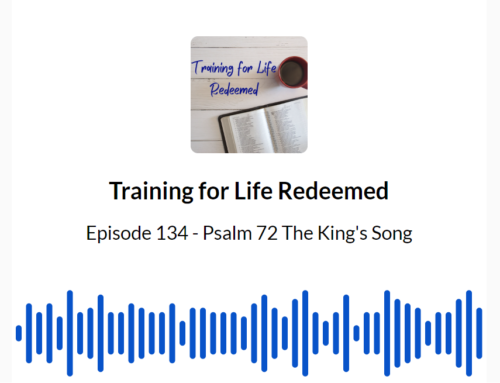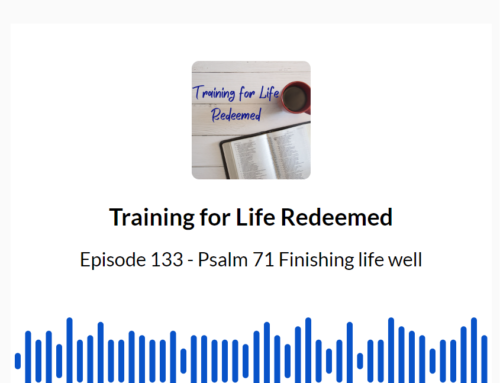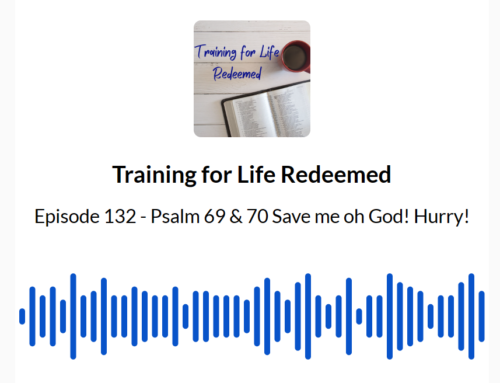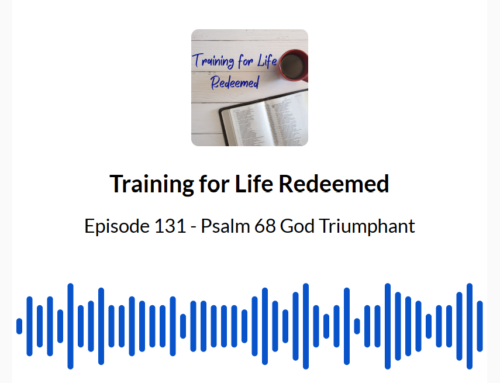Grab your notes for this episode by completing the form
and we will send you the link to all our notes.
We are aware of the wickedness of this world and it hurts. We have sleepless nights worrying about what other people are doing. God calls us to step back and watch what he is doing and share the joy of his plans and justice instead.
Dan: [0:00] Hi everyone, and welcome to Training for Life Redeemed. I’m Dan, here with my father, David Jackson, who’s the one who talks and has all the information, I just sit here and ask questions.
So, we’re going to dive into Psalm 64 today.
Let’s have a listen to the psalm.
David:
Psalm 64,
0 For the director of music, a composition of David.
1 Hear, O God, my voice in my troubled thinking.
You preserve my life from enemy terror.
2 You hide me from the conspiracy of evil people,
from a throng of trouble-makers.
3 who sharpen their tongue like the sword.
They load a bitter word as they would fit their arrow
4 to shoot the innocent from hidden positions.
Suddenly they shoot and they are not afraid.
5 They promote an evil idea to themselves.
They explain how to hide snares.
They say, “Who will see them?”
6 They work out injustices.
“We perfected the plot we worked out.”
The inner heart of a person is deep.
7 God shoots an arrow at them.
Their wounds are sudden.
8 Their own words bring them down.
All who look at them reel.
9 Every man fears.
They recount God’s work,
and they consider his actions.
10 The righteous rejoice in Yahweh,
and seek refuge in him,
and all the upright in heart rave with excitement.
Dan: [1:19] All right, Dad, now in the last psalm, you just said that David was asking for vindication in relation to his enemies because they were slandering him, and then here, he’s going to continue that. Because people are still speaking things about David that are not true, whether it’s the same point in history or not, we don’t really know, but people spoke pretty bad things about David most of his life, really, unless he was sitting on the throne. So there’s this concern that David has for his reputation that seems to come up a fair bit in his psalms.
David:
Yeah, and that’s the theme that links this psalm to the last one.
So he ends by saying, silence their slander, and this one is all about their slander. [2:04] And they’re doing all of this behind his back. So, the kids at school used to have that line, it’s a one-worder, busted. [2:16] You’re out there sneaking around doing the bad stuff, and as soon as you get caught, people would just erupt with laughter and say, busted, you’re sprung. And that’s what’s happening to David’s enemies here, he’s calling for God to bust them.
Dan: Yeah, but I mean, these enemies are pretty confident, You go through this first kind of stanza that you’ve got here and it comes to this point where they’re like, oh we’ve perfected our idea, our plot, we’ve got it all sorted, it’s going to work. [2:45] And then like the next verse is just like, God shows up and there’s poisonous darts everywhere, the arrows in them and it actually reminds me a lot of Job, where all of his friends are sitting there telling Job, you know, you’re the one who’s done the wrong thing and essentially slandering Job and then God shows up and defends Job and says to all the other people, you know, why do you speak all these slanderous things that are not true? [3:13] Job gets vindicated in the end. So it reminds me a lot of that.
Is this a repeated, it is a repeated thing really throughout the Bible as well as in the Psalms of God showing up, but kind of showing up in a way that surprises people because it’s sudden, it’s, you know, Jesus talks about not knowing the time or the hour when he’s going to return. We have a kind of similar thing where we’re like, we’re just doing our thing and people think their plans are all good and true and sorted and then eventually he’s going to show up.
David: Well, there’s this sort of poetic drama that God likes to do. And I must admit, teachers like to do it too. We take our cue from God. [4:01] But the thought of you know what they’re up to. Nothing can be hidden from God.
So the idiot, the fool, as the Bible calls them, assumes that they can keep everything secret and covered and hidden. They can sneak around in the dark. They can make their plans. They can plot and scheme. So in the New Testament with Jesus, you see the Sanhedrin fellows meeting in the basement of Caiaphas’s house in the middle of the night, plotting and scheming and doing their thing. You see Judas sneaking around making deals. He sneaks out when they get to Jerusalem to go and make a deal with the priests. Then at the Lord’s Supper, he realizes Jesus has sprung him. [4:51] Jesus says the hand that dips the food in. Everybody’s going, is it me, is it me? And Jesus is looking at Judas going, off you go, go and do what you got to do. And Judas, he was planning to arrest Jesus after the feast. But now he’s busted, and so he rushes in and…
Calls them in that night. And of course, that’s the night Jesus planned that they would do that.
So, it’s almost a joke happening on God’s enemies that they’re out there thinking they’re so clever and they’ve got their ambush planned on God’s people and God’s sitting back going, yeah, that’s where I want you to move that chess piece and that chess piece. And then in this little quiet moment, but you just get, checkmate, and he drops it on them.
And so here is this, but we’re in this place where we, God can see all this happening, we can’t. We just know they’re out there mumbling and carrying on and doing something, and you go back to God and say, I don’t know what they’re up to, but you do. [6:09] So hear, oh God, the voice of my troubled thinking. I’m in here in turmoil because they’re all out there plotting and scheming against me. They’re troublemakers, that’s a really good word. Their tongue is like a sword, it’s aimed at me. These bitter words, they’re like arrows. He’s feeling the weight of all of this.
And God is saying, no, just wait, wait up, wait till their plot has matured and hatched and we can catch them all at the same time. But we’ve got to endure that in the meantime.
[6:47] The last line, verse six, we perfected the plot we worked out. And the comment is, the inner heart of a person is deep. I think that’s just sarcasm.
You know, but yeah, that’s where this song comes from. And I think for Christians, Yeah, if you’re out there in the community, in the workplace, you know that you may not hear what they’re saying or what they’re up to, but you know they’re doing it. And it hurts.
Dan: [7:26] And then, Dad, I think as we go through the psalm, like the section that I mentioned in in our last episode about us recalling, like we’re counting God’s work and they consider his actions, but that’s what’s leading them to be, like we think of that and it brings us joy. Like when you talk about these things, you know, God allows it to kind of get to its fruition and then he steps in and he’s, and if we forget history, you know, history repeats itself, right? And God’s faithful and so ultimately these kinds of things will repeat themselves again.
And so when I look back I can, in one sense be sure, I mean ultimately I am sure, but on this life not necessarily. Ultimately there’s this assurance that whatever they’re planning, God’s got it all sorted. And when I think back and I look through and I’m recounting His actions, and you think of all the times where people have made plans and God has thwarted them, and the next lot of people make plans and God will get rid of that. And then Jesus talks about the guy who saves everything up and then dies that night and then you’ve got him telling Judas like you were talking about. And it’s just God so clearly got things under his control.
[8:48] So then verse 10 becomes natural out of that, where the righteous rejoice, they seek refuge in him, because of course, where else would you go? That’s where you’re safe. That’s the only place. The whole way through. And then I love your translation at the end, they rave with excitement about it. Yes. It’s like, there’s party.
David: [9:06] That moment when God does, you know, rip the cover off and expose what they’re doing and drops his judgment on them, there’s a release, a relief. In that first part of the song, he’s expressing the pressure that has been building up and building up while he knows that these guys are out there doing all this bad stuff. And then when God finally pops the balloon, the relief is massive. [9:38] It’s in proportion to the stress that you were under in the first place.
The difficulty is that in God’s planning and purposes, that release, that dropping the judgment thing, may not happen until they have killed us. [9:59] We have to have a long view of what God is planning and doing. And in that long view, you know that on Judgment Day, when Jesus returns, that’s when the whole thing comes under light. And that’s when we rave with excitement and the whole emotion of all this comes out.
In the meantime, we sing these songs. And these songs are, as you say, reminding us of our history, reminding us of the promises of God, reminding us of the times when he has demonstrated that he keeps his word, and in the middle of that…[10:40] It reminds us to enjoy the joke.
And often in the greatest of fear, the thing that unplugs the fear is the humour. And so when you open the book of Revelation, people have made a great thing about the book of Revelation. They’ve drawn, particularly in the Middle Ages and Renaissance period, they’ve drawn these most horrendous pictures of torture chambers and terror and all kinds of horrendous things going on. But when you read the book of Revelation and some of that sort of literature in the Bible, these are cartoons that are meant to make you laugh.
[11:23] So you’ve got this great big monster of a Roman empire that thinks it’s so big. And then you see one little son of man come flying in and just pop the whole bubble. And you start to realize the Roman Empire was this tiny little thing on this little planet that God created in the midst of this vast universe. And God is just sitting back waiting for his timing to just drop in and take it out. So, and the irony in that, I like this bit in verse, What is it? Eight. Their own words bring them down.
[12:04] So Jesus was very sarcastic. I don’t think evangelicals like sarcasm. Your mother does. But in his sarcasm, you know, he’s accused against slander.
You cast out demons by the prince of demons. And Jesus looks at him and says, well, that can’t be right. I mean, if Satan’s kingdom was divided, it would fall!
[12:33] Well, it is, and it will. And that’s the whole point. And they’re going, that was embarrassing, and they scuttle off. And he’s just standing there grinning.
Of course Satan’s kingdom is divided. That’s what he does. He puts one against the other. Sin separates, death separates. And so it’s their own words, their own plans and schemes that brings them into this screaming mess. I think right now as we’re making this video and podcast and chatting away. [13:08] We’ll go and turn on the news and watch what’s happening in the Middle East and you go, what do you do with that?
Each side is tearing itself apart. And in the whole process, nobody has really got their eyes on God’s plan of redemption. They haven’t discovered the God who came and died in our place so that we would put aside all of this. [13:35] They haven’t, the slander goes on and God is sitting back and saying, when you guys are finished, we’re gong to, all your secrets, all of what’s going on in your heart’s going to be revealed and it’s not a pretty picture and he’s gonna bring his redemption to bear. He promised to do it, he’s going to do it And we sit here saying, bring it on.



